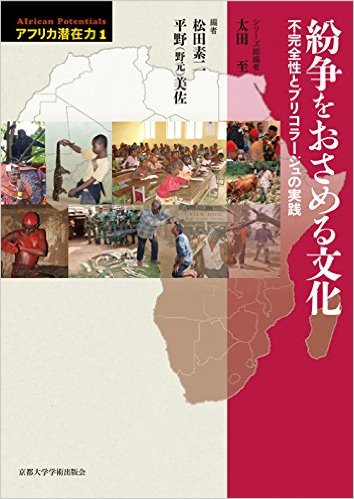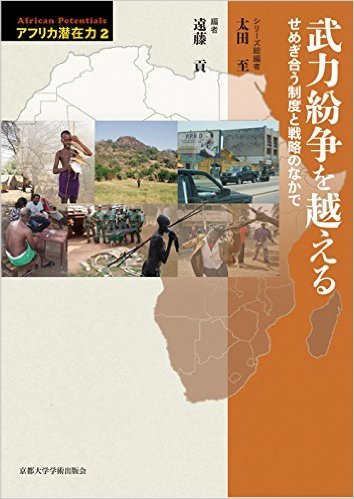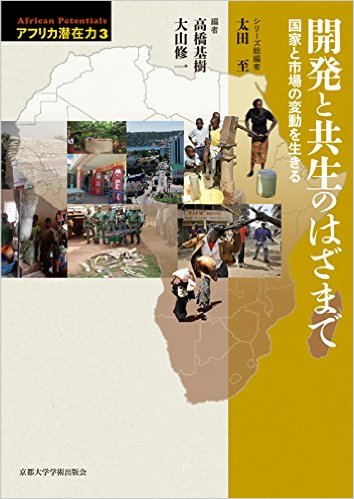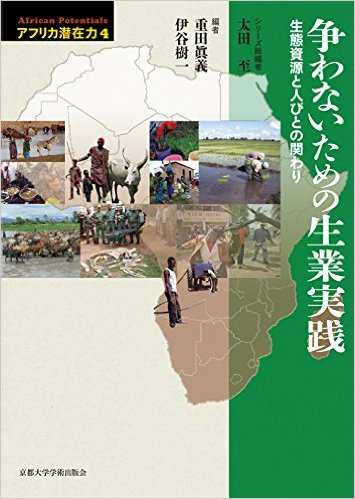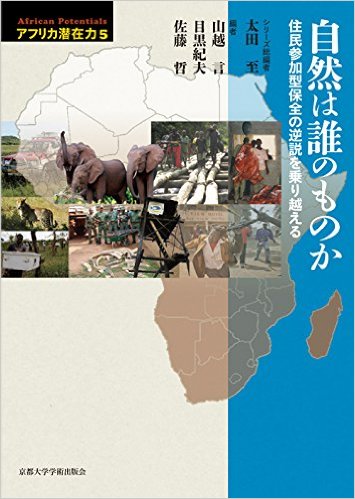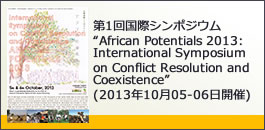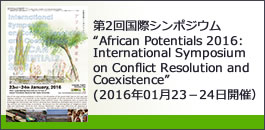「現代アフリカにおける先住民と市民社会」
京都大学アフリカ地域研究資料センター
第2回Kyoto University African Studies Seminar
日 時: 2011年10月21日(金)15:00-18:00
場 所: 京都大学稲盛財団記念館小会議室2 (http://www.asafas.kyoto-u.ac.jp/about/access.html)
共催:京都大学アフリカ地域研究資料センター
プログラム
15:00-15:10 趣旨説明
15:10-16:30 ジョン・ギャラティ(マッギル大学) 「マサイにおける土地紛争と市民社会―ローカルな闘争とグローバルな聴衆」
16:30-16:40 休憩
16:40-18:00 丸山淳子(津田塾大学) 「再定住、開発、先住民運動―南部アフリカ、サン・コミュニティの二つの事例から」
Date: 15:00-18:00 21 Oct 2011
Venue: Small Seminar Room, 3F Inamori Bldg., Kawabata Campus http://www.asafas.kyoto-u.ac.jp/en/about/access.html
15:00-15:10 Introduction
15:10-16:30 John Galaty (McGill University) “Maasai Land Conflicts and Civil Society: Local Struggles and a Global Audience”
16:30-16:40 Coffee break
16:40-18:00 Junko Maruyama (Tsuda College) “Resettlement, Development and Indigenous Peoples’ Movement: Two Cases from San Communities in Southern Africa”
発表要旨
John Galaty “Maasai Land Conflicts and Civil Society: Local Struggles and a Global Audience”
The ascendency of the state in Africa and the process of privatizing agrarian land has made many rangeland communities vulnerable to having their mobility drastically curtailed and even to losing their land. This paper will examine the opportunistic seizure of pastoral lands by a variety of actors, including smallholder farmers, political class, entrepreneurs, commercial farmers, speculators, conservationists, tour operators, miners, and foreign states, from the colonial period to the present. From small- to large-scale, valuable pastoral lands have been or are being acquired through local incursions, state allocation or purchase, promising to use it for highly efficient commercial agriculture, or by conservation groups and entrepreneurs who vow to protect wildlife and at the same time propagate high-end lucrative tourist ventures. Land displacements have come to represent a major cause of violent conflicts and legal disputes in pastoral regions. In recent decades, organizations of civil society have increasingly sprung up to defend pastoral land rights, often linking their causes to claims of indigeneity anchored in the creation of the Permanent Forum on Indigenous Issues. The global audience for indigenous land loss and the advocacy of national and international civil society has both mitigated and stimulated local conflicts. Paradoxically, as indigenous land rights have been recognized, actual land loss has accelerated due to the increasingly aggressive role of the state in large-scale land acquisitions by outside parties. This paper will examine the interaction between land grabbing, land losses, and land conflicts, and role played by civil society and assertions of indigenous rights in Eastern and Southern Africa, with special focus on the experience of the Maasai of Kenya and Tanzania.
Junko Maruyama “Resettlement, Development and Indigenous Peoples’ Movement: Two Cases from San Communities in Southern Africa”
The notion that indigenous peoples should have the right to maintain their distinct cultures, lifestyles, and territories has become widely accepted within the international community during the last two decades. While the concept “indigenous peoples” is highly controversial in African context compared with the more consensual situation in nations with white settlers, the San hunter gatherers of Southern Africa also have been involved in global indigenous peoples’ movement, and become one of the best-known “indigenous peoples” in Africa. Indeed, recently some groups of the San have successfully acquired land rights, with the support of the global movement. Of these, two cases from Botswana and South Africa will be highlighted in this presentation; Botswana San won in court the right to return to their land in nature conservation area, and the San in South Africa were handed over land title deeds from President Mandela. Both cases were hailed by NGOs, activists, and the mass media as a landmark for the rights of indigenous peoples in Africa. This presentation will analyze the historical backgrounds and the negotiation process of these two cases, and then elucidate the San’s livelihood and social relationships after they gained land-use rights. Finally, by comparing both cases, dynamics underlying relationships between the San and national and international communities, and positive and negative impacts of the global indigenous peoples’ movement on the San will be discussed.
報告
ジョン・ギャラティ(マッギル大学) 「マサイにおける土地紛争と市民社会―ローカルな闘争とグローバルな聴衆」
ギャラティ氏は、東アフリカ牧畜社会で進展している開発プロジェクトに関する発表をおこなった。とくに多様なアクターを巻き込みながら展開している、牧畜民が利用している土地の剥奪について中心的に論じた。それらの土地は、大規模商業農場や野生動物保護区にすることなどを目的として、国家や外国・国内企業などが取得している。またより小規模ではあるが、農耕民による放牧地の農地化も進められてきた。この土地剥奪は牧畜集団間の土地をめぐる相克を深める危険がつよいが、近年では市民社会組織らが「土着性(indigeneity)」の主張を武器に、牧畜民の土地権利を保護するための活動をおこなっている。これらの組織の活動は、ローカルな紛争を緩和することがある一方で、新たな対立軸を地域に持ち込むことで、紛争をより複雑なものにすることもある。そして皮肉なことに、グローバルな市民社会組織の権利保護活動が高まりつつある時期に、国家は外国資本などによる大規模な土地取得を擁護する政策を取っているのである。
丸山淳子(津田塾大学) 「再定住、開発、先住民運動―南部アフリカ、サン・コミュニティの二つの事例から」
アフリカでは、アメリカ大陸やオーストラリアとは異なり、「先住民」という概念はきわめて論争的な概念である。丸山氏は、アフリカの「先住民」としてもっともよく知られた集団の一つであるサンの人びととグローバルな先住民運動とのかかわりを、ボツワナと南アフリカの事例から比較検討した。サンは近年になって、グローバルな先住民運動からの支援を受けつつ、土地への権利を取得することに成功した。ボツワナでは、司法判断により自然保護地域とされていた彼らのもともとのテリトリーが返還されることになり、南アフリカではマンデラ大統領による土地権利譲渡によって土地を獲得した。丸山氏は、両地域の土地取得にいたるまでの歴史的背景やローカル、ナショナル、グローバルなアクターを巻き込んだ先住性をめぐる交渉プロセス、そして土地取得後のサンの人たちの生活戦略を分析したあと、グローバルな先住民運動がサンにもたらしたポジティヴ、ネガティヴな側面をまとめた。
